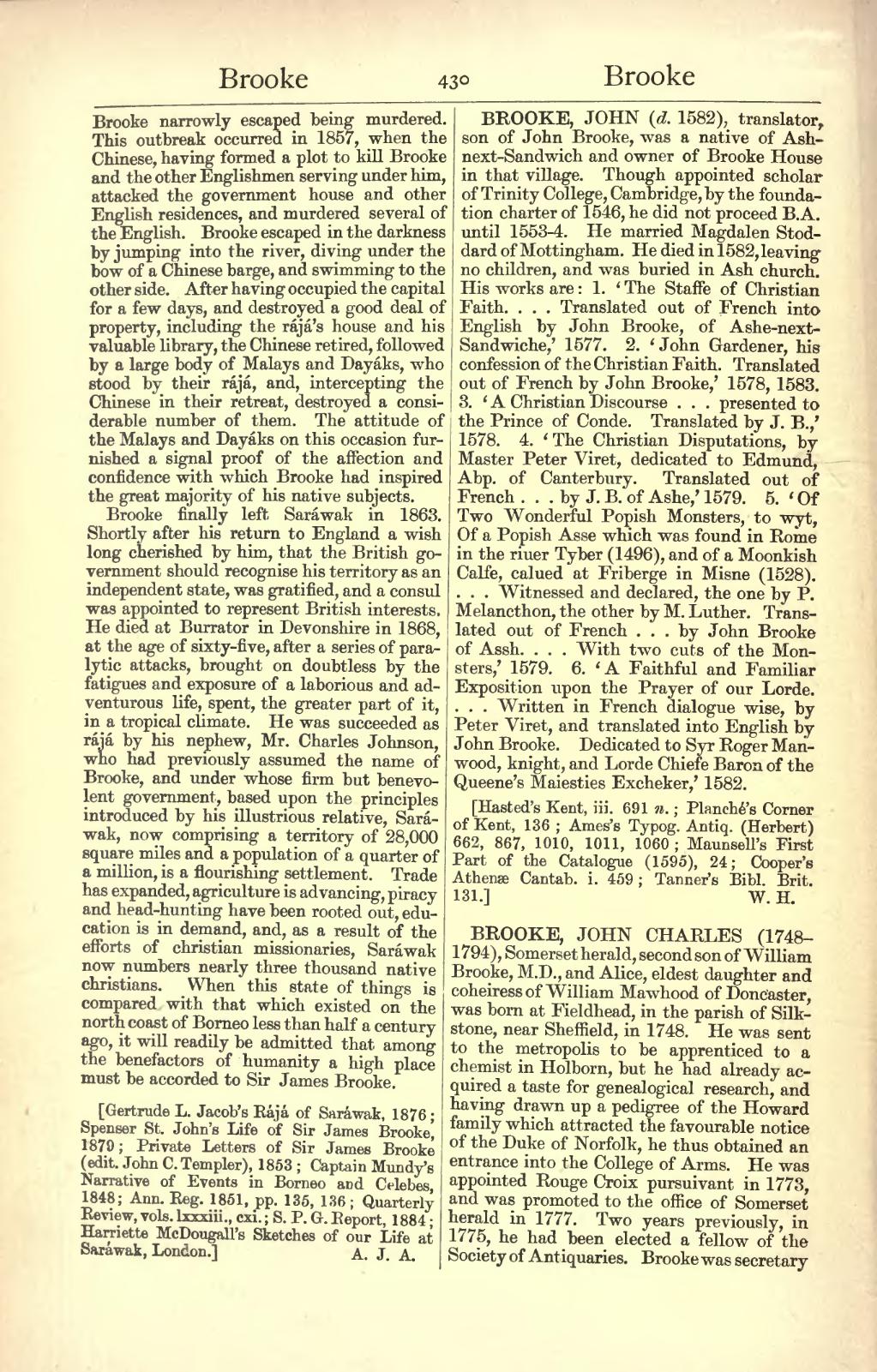Brooke narrowly escaped being murdered. This outbreak occurred in 1857, when the Chinese, having formed a plot to kill Brooke and the other Englishmen serving under him, attacked the government house and other English residences, and murdered several of the English. Brooke escaped in the darkness by jumping into the river, diving under the bow of a Chinese barge, and swimming to the other side. After having occupied the capital for a few days, and destroyed a good deal of property, including the rájá's house and his valuable library, the Chinese retired, followed by a large body of Malays and Dayáks, who stood by their rájá, and, intercepting the Chinese in their retreat, destroyed a considerable number of them. The attitude of the Malays and Dayáks on this occasion furnished a signal proof of the affection and confidence with which Brooke had inspired the great majority of his native subjects.
Brooke finally left Saráwak in 1863. Shortly after his return to England a wish long cherished by him, that the British government should recognise his territory as an independent state, was gratified, and a consul was appointed to represent British interests. He died at Burrator in Devonshire in 1868, at the age of sixty-five, after a series of paralytic attacks, brought on doubtless by the fatigues and exposure of a laborious and adventurous life, spent, the greater part of it, in a tropical climate. He was succeeded as rájá by his nephew, Mr. Charles Johnson, who had previously assumed the name of Brooke, and under whose firm but benevolent government, based upon the principles introduced by his illustrious relative, Saráwak, now comprising a territory of 28,000 square miles and a population of a quarter of a million, is a flourishing settlement. Trade has expanded, agriculture is advancing, piracy and head-hunting have been rooted out, education is in demand, and, as a result of the efforts of Christian missionaries, Saráwak now numbers nearly three thousand native Christians. When this state of things is compared with that which existed on the north coast of Borneo less than half a century ago, it will readily be admitted that among the benefactors of humanity a high place must be accorded to Sir James Brooke.
[Sarawak, 1876; Spenser St. John's Life of Sir James Brooke, 1879; Private Letters of Sir James Brooke (edit. John C. Templer), 1853; Captain Mundy's Narrative of Events in Borneo and Celebes, 1848; Ann. Reg. 1851, pp. 135, 136; Quarterly Review, vols.lxxxiii., cxi.; S. P. G. Report, 1884; Harriette McDougall's Sketches of our Life at Saráwak, London.]
BROOKE, JOHN (d. 1582), translator, son of John Brooke, was a native of Ashnext-Sandwich and owner of Brooke House in that village. Though appointed scholar of Trinity College, Cambridge, by the foundation charter of 1546, he did not proceed B.A. until 1553-4. He married Magdalen Stoddard of Mottingham. He died in 1582, leaving no children, and was buried in Ash church. His works are:
- 'The Staffe of Christian Faith. … Translated out of French into English by John Brooke, of Ashe-next-Sandwiche,' 1577.
- 'John Gardener, his confession of the Christian Faith. Translated out of French by John Brooke,' 1578, 1583.
- 'A Christian Discourse … presented to the Prince of Conde. Translated by J. B.,' 1578.
- 'The Christian Disputations, by Master Peter Viret, dedicated to Edmund, Abp. of Canterbury. Translated out of French … by J. B. of Ashe,' 1579.
- 'Of Two Wonderful Popish Monsters, to wyt, Of a Popish Asse which was found in Rome in the riuer Tyber (1496), and of a Moonkish Calfe, calued at Friberge in Misne (1528). … Witnessed and declared, the one by P. Melancthon, the other by M. Luther. Translated out of French … by John Brooke of Assh. … With two cuts of the Monsters,' 1579.
- 'A Faithful and Familiar Exposition upon the Prayer of our Lorde. … Written in French dialogue wise, by Peter Viret, and translated into English by John Brooke. Dedicated to Syr Roger Manwood, knight, and Lorde Chiefe Baron of the Queene's Maiesties Excheker,' 1582.
>[Hasted's Kent, iii. 691 n.; Planché's Corner of Kent, 136; Ames's Typog. Antiq. (Herbert) 662, 867, 1010, 1011, 1060; Maunsell's First Part of the Catalogue (1595), 24; Cooper's Athenæ Cantab, i. 459; Tanner's Bibl. Brit. 131.]
BROOKE, JOHN CHARLES (1748–1794), Somerset herald, second son of William Brooke, M.D., and Alice, eldest daughter and coheiress of William Mawhood of Doncaster, was born at Fieldhead, in the parish of Silkstone, near Sheffield, in 1748. He was sent to the metropolis to be apprenticed to a chemist in Holborn, but he had already acquired a taste for genealogical research, and having drawn up a pedigree of the Howard family which attracted the favourable notice of the Duke of Norfolk, he thus obtained an entrance into the College of Arms. He was appointed Rouge Croix pursuivant in 1773, and was promoted to the office of Somerset herald in 1777. Two years previouslv in 1775, he had been elected a fellow of the Society of Antiquaries. Brooke was secretary
